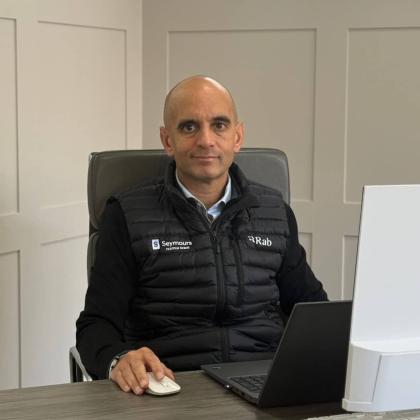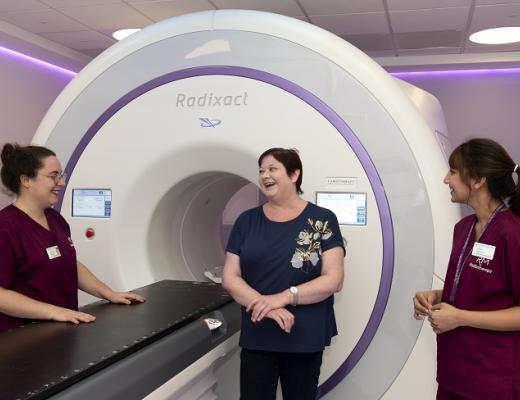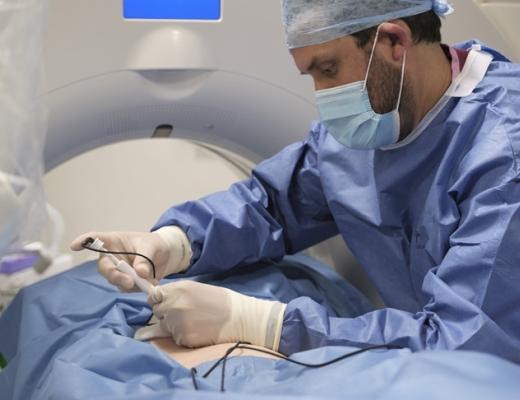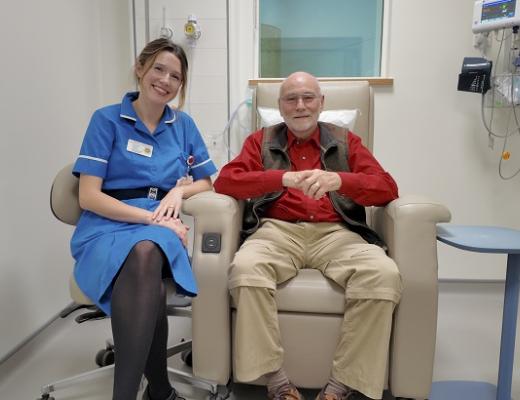First-of-its-kind microsurgery robot huge leap forward for minimally invasive cancer surgery
The Royal Marsden is the first hospital in the UK to be using the Symani system, which aims to speed up recovery and improve quality of life for patients having reconstructive surgery following cancer treatment.
Robotics have played a big role in the advancement of cancer surgery and, thanks to funding from The Royal Marsden Cancer Charity, The Royal Marsden is welcoming a brand new robot. Here on a three-year lease, The Symani® Surgical System by MMI (Medical Microinstruments, Inc.) ® aims to support advancements in minimally invasive cancer surgery for the benefit of cancer patients worldwide.
The three-year lease of the Symani Surgical System has been made possible thanks to the Denise Coates Foundation and Mrs Emma Bishop’s generous support of The Royal Marsden Cancer Charity.

What is the Symani robot?
The robot is called the Symani® Surgical System by MMI (Medical Microinstruments, Inc.). It is designed for microsurgery, which is a highly specialised technique where surgeons repair tiny anatomical structures such as blood or lymphatic vessels.
Microsurgery is an important part of treatment for many cancer patients. Following the surgical removal of cancerous tissue, microsurgical reconstruction plays an essential part in helping patients regain their quality of life by reconstructing tissues and structures that were removed during cancer treatment. For example, this may be through repairing tiny vessels to restore blood flow or enabling reliable wound healing.
By replicating the same natural movements of the human hand at a micro scale, the robot will help surgeons work on tiny vessels under 1mm with huge precision. It has the potential to offer cancer patients faster recovery, less pain and improve quality of life following surgery.

Mr Kieran Power, Head of the Plastic Surgery Unit and Consultant Plastic and Reconstructive Surgeon, said
“We are hugely excited by the potential of Symani and the possibilities it offers patients. Thanks to hugely generous supporters of The Royal Marsden Cancer Charity, we have the opportunity to play a leading role in this field, helping to develop new, less invasive surgical options that will benefit patients worldwide.”
Five ways Symani could be used at The Royal Marsden
The expertise of surgeons at The Royal Marsden will help to bring the benefits of this innovative robot to patients as soon as possible. There are many ways the robot could be used at the hospital:
-
Reconstruction surgery for people who are undergoing a surgical removal of a sarcoma.
This is a rare type of cancer that develops in the body’s connective tissues, including fat, muscle, nerves and blood and lymph vessels.

Nick, 47, was the first patient to undergo reconstructive surgery using Symani at The Royal Marsden. He underwent the removal of a soft tissue sarcoma in his chest.
“Recovery from my surgery has been excellent, and everything is healing really well. I’m certain I wouldn’t be doing as well, or recovering as quickly after such a major operation, if I hadn’t been treated with this new robotic technology”.
-
Autologous breast reconstruction (also known as free flap or free tissue transfer).
This is when the patients’ own tissue is used to rebuild the breast after a mastectomy. The precision of robotic microsurgery has the potential to result in a less invasive procedure, meaning patients experience much less post-operative pain and spend less time in hospital.
-
Surgery for lymphoedema, which is a build-up of fluid causing swelling and chronic pain following treatment.
Microsurgical repair will help to prevent the development of lymphoedema and reduce complications where tissue is removed following cancer surgery.
-
Improve nerve repair for head and neck cancer patients.
Current operations can be invasive, and can significantly impact a patient’s ability to swallow and their speech. In severe cases, it can cause facial paralysis, and these patients require a long recovery in hospital.
- To treat other cancer types such as lung, skin, gynaecological and urological.
The future of microsurgery
The Royal Marsden will also set up a UK-first research programme called ‘INnovations in robotiC mIcroSurgEry’ (INCISE). INCISE will assess the benefits of robotic microsurgery using Symani, with an aim to share learnings with colleagues across the NHS for the benefit of cancer patients across the UK and beyond.
Mr Aadil Khan, Consultant Plastic Surgeon and Reconstructive Surgeon at The Royal Marsden, said: “The expertise of our multidisciplinary team at The Royal Marsden not only enables us to bring the benefits of this pioneering technology to patients as soon as possible, but it also means we are uniquely placed to evaluate Symani and carry out extensive research in this area across different cancer types."
For example, INCISE aims to test if Symani can be used to help surgeons perform complex procedures like nerve repair with improved precision and control, potentially supporting the return of normal swallowing and speech, reducing the length of stay in hospital and improving patients’ quality of life.
This will help to set international standards of treatment and care for patients undergoing reconstructive cancer surgery.
Thanks to funding from The Royal Marsden Cancer Charity
“We are delighted that the Charity’s funding has made it possible for The Royal Marsden to pave the way in improving cancer treatment and care, for the benefit of patients right across the UK and around the world. We are so thankful to the Denise Coates Foundation and Mrs Emma Bishop for their exceptional support.” says Antonia Dalmahoy, Managing Director of The Royal Marsden Cancer Charity.
Thanks to supporters like you, we can develop new, more effective ways of identifying, diagnosing and treating cancer – improving the lives of cancer patients now and into the future.
Find out more about ways you can support us.
Help us transform the lives of cancer patients across the UK and around the world


